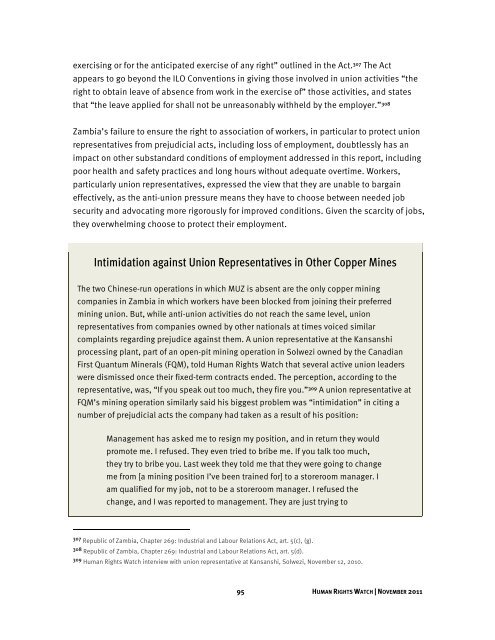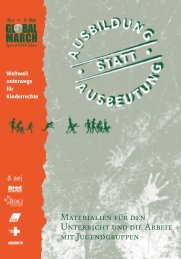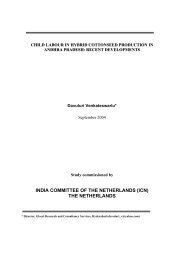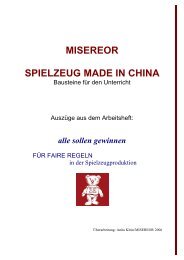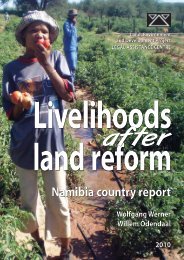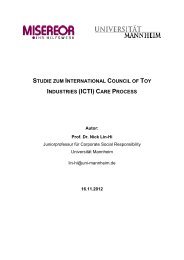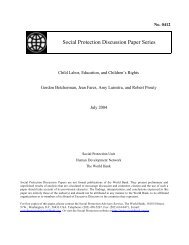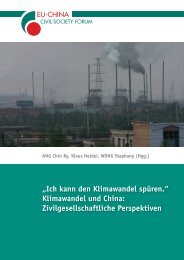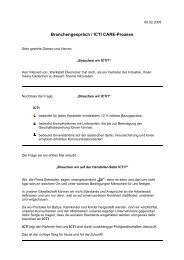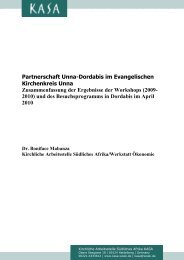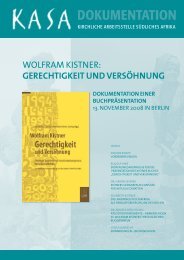“You'll Be Fired if You Refuse†- Human Rights Watch
“You'll Be Fired if You Refuse†- Human Rights Watch
“You'll Be Fired if You Refuse†- Human Rights Watch
Create successful ePaper yourself
Turn your PDF publications into a flip-book with our unique Google optimized e-Paper software.
exercising or for the anticipated exercise of any right” outlined in the Act. 307 The Act<br />
appears to go beyond the ILO Conventions in giving those involved in union activities “the<br />
right to obtain leave of absence from work in the exercise of” those activities, and states<br />
that “the leave applied for shall not be unreasonably withheld by the employer.” 308<br />
Zambia’s failure to ensure the right to association of workers, in particular to protect union<br />
representatives from prejudicial acts, including loss of employment, doubtlessly has an<br />
impact on other substandard conditions of employment addressed in this report, including<br />
poor health and safety practices and long hours without adequate overtime. Workers,<br />
particularly union representatives, expressed the view that they are unable to bargain<br />
effectively, as the anti-union pressure means they have to choose between needed job<br />
security and advocating more rigorously for improved conditions. Given the scarcity of jobs,<br />
they overwhelming choose to protect their employment.<br />
Intimidation against Union Representatives in Other Copper Mines<br />
The two Chinese-run operations in which MUZ is absent are the only copper mining<br />
companies in Zambia in which workers have been blocked from joining their preferred<br />
mining union. But, while anti-union activities do not reach the same level, union<br />
representatives from companies owned by other nationals at times voiced similar<br />
complaints regarding prejudice against them. A union representative at the Kansanshi<br />
processing plant, part of an open-pit mining operation in Solwezi owned by the Canadian<br />
First Quantum Minerals (FQM), told <strong>Human</strong> <strong>Rights</strong> <strong>Watch</strong> that several active union leaders<br />
were dismissed once their fixed-term contracts ended. The perception, according to the<br />
representative, was, “If you speak out too much, they fire you.” 309 A union representative at<br />
FQM’s mining operation similarly said his biggest problem was “intimidation” in citing a<br />
number of prejudicial acts the company had taken as a result of his position:<br />
Management has asked me to resign my position, and in return they would<br />
promote me. I refused. They even tried to bribe me. If you talk too much,<br />
they try to bribe you. Last week they told me that they were going to change<br />
me from [a mining position I’ve been trained for] to a storeroom manager. I<br />
am qual<strong>if</strong>ied for my job, not to be a storeroom manager. I refused the<br />
change, and I was reported to management. They are just trying to<br />
307 Republic of Zambia, Chapter 269: Industrial and Labour Relations Act, art. 5(c), (g).<br />
308 Republic of Zambia, Chapter 269: Industrial and Labour Relations Act, art. 5(d).<br />
309 <strong>Human</strong> <strong>Rights</strong> <strong>Watch</strong> interview with union representative at Kansanshi, Solwezi, November 12, 2010.<br />
95 HUMAN RIGHTS WATCH | NOVEMBER 2011


